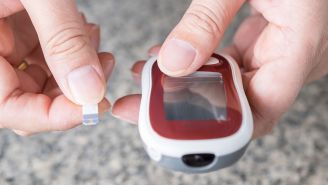Updated on March 22, 2024.
According to the American Diabetes Association (ADA), adults with diabetes are almost twice as likely to have a heart attack or stroke as those without diabetes. Regular exercise and healthy eating can help keep your heart healthy. But your doctor may also recommend medication to help lower your risk.
Here’s what you need to know about common contributors to heart disease, and the medications most often prescribed to treat them.
What to know about blood pressure
Blood pressure is the force of blood flow inside your blood vessels. If those vessels are stiff or narrow, your blood pressure can increase. This can make your heart work harder than it should, damaging it over time and putting you at increased risk for heart attack, stroke, eye problems, and kidney disease. As many as two in three adults with diabetes have high blood pressure, also called hypertension. If you have diabetes, the ADA recommends having your blood pressure checked at every routine doctor’s visit.
Your healthcare team will use two numbers to describe your results—for instance, 120/80 mmHg. The first number—known as “systolic” pressure—refers to the pressure your blood exerts as it pushes through your blood vessels when your heart beats. The second number—“diastolic” pressure—refers to the pressure between heartbeats, when the vessels relax and your heart is filling with blood. For most adults the ADA recommends the following:
- If you have diabetes and are at higher risk of heart disease, aim for keeping your blood pressure below 130/80 mmHg
- If you are at lower risk for heart disease, aim for keeping your blood pressure lower than 140/90 mmHg.
- If you are pregnant and have diabetes and high blood pressure, it’s suggested you stay in the 110-135/85 mmHg range.
High blood pressure medications
Your HCP may treat high blood pressure with medication combined with lifestyle changes like regular exericse and a healthy diet rich in whole foods and low in sugar, salt and saturated fat (which is solid at room temperauture, like butter). There are several kinds of blood pressure drugs, though not all of them are equally good for people with diabetes. Some raise blood sugar levels or mask some of the symptoms of low blood sugar (hypoglycemia). And you may need one or more to reach your blood pressure goals.
- ACE inhibitors. Angiotensin-converting enzyme inhibitors (ACE inhibitors) are recommended for most people who have diabetes, high blood pressure, and kidney disease. Drugs in this category—which include captopril and enalapril—work by keeping your blood vessels relaxed. Specifically, they prevent a hormone called angiotensin from forming in your body and narrowing your blood vessels.
- ARBs. Angiotensin II receptor blockers (ARBs) also lower blood pressure by keeping your blood vessels open and relaxed. Like ACE inhibitors, ARBs have been proven to slow down or even halt the progression of kidney disease by maintaining blood pressure control. The ADA recommends one of these two blood pressure medications if you have diabetes and kidney disease. (You should not be on both at the same time, as it can cause kidney issues.)
- Calcium channel blockers. These medicines help the blood vessels relax by keeping calcium out of the cells of your blood vessels and heart. To prevent heart disease if you have diabetes but don’t have kidney disease, your doctor may prescribe a calcium channel blocker instead of, or in addition to, an ACE inhibitor or ARB.
- Diuretics. Also called "water pills," diuretics help your body get rid of extra water through your urine. That reduces the amount of fluid flowing through your blood vessels, which eases the pressure on them. If you’re pregnant, diuretics are not usually recommended for blood pressure control.
Cholesterol medications
Cholesterol is a type of fat produced by your liver and found in your blood. Low-density lipoproteins—also known as LDL, or "bad" cholesterol—can contribute to deposits called plaque that clog your blood vessels. If you have too much LDL, you’re at greater risk of a heart attack or stroke.
High-density lipoproteins—also called HDL, or "good" cholesterol—helps remove the LDL from your blood vessels.
People with diabetes are typically advised to make lifestyle changes to help lower their cholesterol and are also prescribed a drug called a statin to reduce their LDL levels. With rare exceptions, the ADA recommends that adults with diabetes take a statin.
Depending on how you respond to statins, your doctor may also prescribe an additional LDL-lowering medication. Your dose will depend on whether you have additional risk factors for heart disease.
Should you take aspirin?
The ADA recommends taking a low-dose aspirin every day to help maintain a healthy heart if:
- You’re between the ages of 50 and 69 and have diabetes
- You have at least one of the following: a family history of heart disease, high blood pressure or high cholesterol levels, imbalance of different types of cholesteorl in your blood (called dyslipidemia), chronic kidney disease, or you are a smoker
- You don’t have an increased risk of bleeding
Aspirin can thin your blood and increase your risk for bleeding, as well as increase your risk for stomach ulcers. If you’re not sure whether an aspirin should be part of your daily regimen, ask yourhealthcare provider.
If you have questions about medications to keep your heart healthy when you have diabetes or whether your insurance covers, speak with your healthcare provider.







